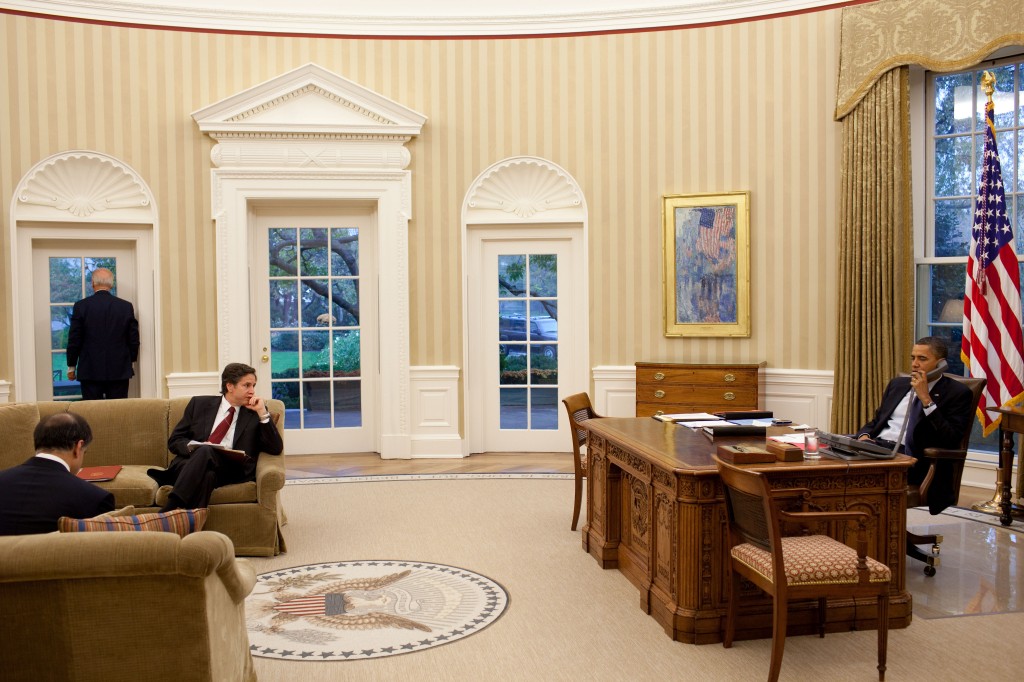President Barack Obama talks on the phone with President Jalal Talabani of Iraq while Vice President Joe Biden, his National Security Advisor Tony Blinken, and Puneet Talwar, Senior Director for Iraq, Iran and the Gulf States wait nearby in the Oval Office, Nov. 4, 2010. (Official White House Photo by Pete Souza).
Sunday’s NYT features an article adapted from the final chapters of The Endgame, which hits stores Tuesday.
Failed Efforts and Challenges of America’s Last Months in Iraq
By Michael R. Gordon
The request was an unusual one, and President Obama himself made the confidential phone call to Jalal Talabani, the Iraqi president.
Marshaling his best skills at persuasion, Mr. Obama asked Mr. Talabani, a consummate political survivor, to give up his post. It was Nov. 4, 2010, and the plan was for Ayad Allawi to take Mr. Talabani’s place.
With Mr. Allawi, a secular Shiite and the leader of a bloc with broad Sunni support, the Obama administration calculated, Iraq would have a more inclusive government and would check the worrisome drift toward authoritarianism under Prime Minister Nuri Kamal al-Maliki.
But Mr. Obama did not make the sale.
“They were afraid what would happen if the different groups of Iraq did not reach an agreement,” recalled Mr. Talabani, who turned down the request.
Mr. Obama has pointed to the American troop withdrawal last year as proof that he has fulfilled his promise to end the Iraq war. Winding down a conflict, however, entails far more than extracting troops.
In the case of Iraq, the American goal has been to leave a stable and representative government, avoid a power vacuum that neighboring states and terrorists could exploit and maintain sufficient influence so that Iraq would be a partner or, at a minimum, not an opponent in the Middle East.
But the Obama administration has fallen frustratingly short of some of those objectives.
The attempt by Mr. Obama and his senior aides to fashion an extraordinary power-sharing arrangement between Mr. Maliki and Mr. Allawi never materialized. Neither did an agreement that would have kept a small American force in Iraq to train the Iraqi military and patrol the country’s skies. A plan to use American civilians to train the Iraqi police has been severely cut back. The result is an Iraq that is less stable domestically and less reliable internationally than the United States had envisioned.
The story of these efforts has received little attention in a nation weary of the conflict in Iraq, and administration officials have rarely talked about them. This account is based on interviews with many of the principals, in Washington and Baghdad.
White House officials portray their exit strategy as a success, asserting that the number of civilian fatalities in Iraq is low compared with 2006, when the war was at its height. Politics, not violence, has become the principal means for Iraqis to resolve their differences, they say. “Recent news coverage of Iraq would suggest that as our troops departed, American influence went with them and our administration shifted its focus away from Iraq,” Antony Blinken, the national security adviser to Vice President Joseph R. Biden Jr., said in a speech in March. “The fact is, our engagements have increased.”
To many Iraqis, the United States’ influence is greatly diminished. “American policy is very weak,” observed Fuad Hussein, the chief of staff to Massoud Barzani, the president of the semiautonomous Kurdish region in northern Iraq. “It is not clear to us how they have defined their interests in Iraq,” Mr. Hussein said. “They are picking events and reacting on the basis of events. That is the policy.”




